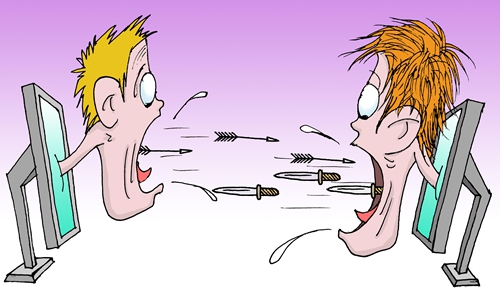HOME >> ARTS
China’s ‘anti-fan’ culture on the rise
By June Source:Global Times Published: 2020/1/13 15:38:15

Photo: CNSphoto
Several state-owned news outlets recently received reports from netizens that social media platforms may allow and even encourage accounts that spread malicious rumors and slander, according to Banyuetan, a semimonthly magazine under the Xinhua News Agency, which was seen as a sign that such accounts are on the rise.When these accounts spread negative information about celebrities to damage their public image, they are called heifen (lit: black fans) in Chinese. These "anti-fans" may end up in fierce arguments with the stars' loyal fans on social media.
Sikun (pseudonym), a veteran fanclub administrator, told the Global Times that, despite rumors to the contrary, most anti-fans do not receive any money to spread negative information targeting celebrities.
Sikun admitted that entertainment agencies do sometimes pay astroturfers to help their entertainers win opportunities such as getting a movie role or becoming an ambassador for a brand by staining the public image of a competing star, but that for the most part astroturfing in China tends to focus more on spreading a positive message about a person or product.
"Most astroturfers though just direct online comments about stars in a positive direction by posting and promoting complimentary messages on social media platforms," Sikun noted.
Twenty-two-year-old Cathy (pseudonym), another experienced fan who once tried to establish a fanclub for an entertainer she likes, agrees with Sikun.
"The severest arguments are started by common fans," Cathy said.
If two entertainers are competing against each other, their fans may start an internet war against the other star.
After Chinese actress Zheng Shuang and girl band Rocket Girls 101 member Wu Xuanyi coincidentally appeared together in a passersby's photos taken at an airport, fans of these two stars began to argue over which idol is more popular. As the arguments became increasingly severe, some netizens left abusive messages on the Sina Weibo account of Zheng's father. In the end, Zheng had to take legal action by suing several of Wu's fans.
According to Cathy, some fans will not reveal which idol they are dedicated to when conducting anti-fan activities against certain stars in order to prevent those stars' fans from attacking their idol in return.
"The anti-fans help their idols win battles and feel a sense of accomplishment by fighting against targeted stars," Cathy said, explaining these anti-fans' motivation.
However, sometimes this benefit can go beyond abstract feelings.
Cathy pointed to the example of a Sina Weibo account that attracted a large amount of followers while verbally attacking and smearing Chinese singer-actor and EXO member Zhang Yixing. After the number of followers grew to around 270,000, the account began to provide charged services for promoting stars.
When these battles become fierce enough, the Sina Weibo "public square" of a star may become totally polluted with negative information. A public square refers to the results one gets when you search the star's name on the platform. Sikun told the Global Times that almost all dedicated Chinese fans use a mobile app called MoreFans, which can be used to "decontaminate" a star's "square."
Using the app, fans can input a term and the app will go through and give likes to all positive hashtags related to the term, thereby causing these positive hashtags to rise in the trending lists.
"Anti-fans don't damage fandom culture because mocking someone online is a kind of routine, and can be cheerful and relaxing. Only battles between different fan groups ever become really intense," said Sikun.
RELATED ARTICLES:
Posted in: CULTURE & LEISURE,WHAT’S ON